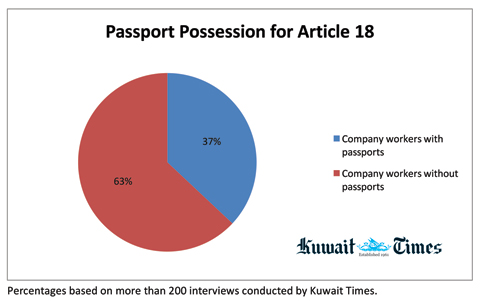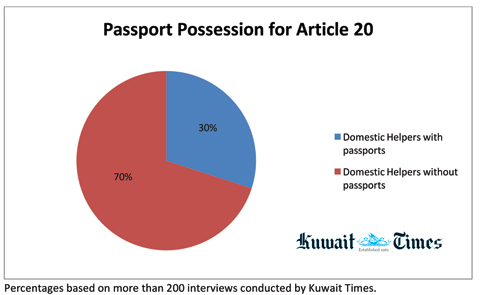A majority of low skilled expat workers in Kuwait, mostly Asians, say they are not in possession of their passports. Kuwait Times randomly surveyed around 200 workers holding article 18 and article 20 visas, many of whose passports are held by their employers. Sixty-three percent of private sector employees and almost 70 percent of domestic helpers said their passports are retained by their sponsors. The domestic workers are mostly from the Philippines, Bangladesh, India and Sri Lanka, many of them maids, drivers, gardeners and cooks.
"I get two days off a month, and for me this is more important than my passport," said Emma Peregrino Espiritu, a Filipina housemaid who participated in the survey. "At least I can enjoy a day off, so I am okay with it. But if it is given to me by my employer, I will keep it," she said. Espiritu is a holder of an article 20 visa and has been working with her sponsor for the past eight years.
Indika C, a Sri Lankan man whose family is also in Kuwait, said all their passports are with him. "I work in a taxi company, and have my passport and that of my family with me. The company doesn't really care," he said.
Mamin K, a Bangladeshi family driver holding an article 20 visa, said his passport was with his sponsor. "I don't have my passport with me - it's with my sponsor. When I go home, I will ask him for my passport," he said.
It is illegal for employers to hold the passports of employees, and this is clearly stated in ministry resolution number 143/A/2010 in Article 1: "It is prohibited for private sector employers and oil sector employers to hold travel documents of their employees." Sponsors of domestic workers may keep the passport, but only with the worker's consent.
In May, the Philippines and Kuwait signed a memorandum of agreement allowing domestic helpers' passports to be deposited at the Philippine Embassy, but many employers are yet to do so. "My boss asked if I wanted my passport. I said yes, so she gave it, and it's with me now since June," said Genskie Morales, a domestic helper from the Philippines. "I am happy that I am holding my own passport, so any time I want to leave, I can leave freely," she said.
Many white collar and office workers will be allowed to keep their passports - but not in all professions. Accountants or employees with access to safes, money and other banking info may have their passports kept by employers. Managers of small businesses or companies where owners travel frequently may also keep the passports of their employees as a safeguard against absconding.
Lower skilled workers of some large corporations in Kuwait may also have their passports confiscated as standard company policy, despite the labor law.
"I work in a huge fast-food company, and all our passports are in a vault in their passport department. No one is allowed to keep their passports. We are told to surrender the passport immediately if we ever take it. We can request to get the passport at any time, especially during vacations or renewals, but after this it has to be returned to the HR department. Probably they don't trust us or maybe they think we will transfer to another company if we have the passport," said an employee who has been working for the company for the last five years.
Jomie Calising Tayer and Daniel Casiban, working in Kuwait on article 18 visas, said if the company says so, they cannot do anything. "It's company policy, so we cannot do anything about it. Since I transferred to this company, I don't have my passport. We are mere workers. If we need it, we can always borrow our passports," they said. Liezl Garcia Sogillo said even their civil IDs are not in their possession, let alone the passport. "We can borrow the civil ID if we want, but we have to return it after using it," she said.
Mae Ortiz, a Filipina married to a Kuwaiti, said that all passports of her housemaids are in their maids' possession. "I do not want to get into trouble - if the law says it has to be with the workers, I follow it. I give them a day off too. The original civil IDs are also with them - they can leave the house and I am ready to transfer them to another employer if they wish too. We have to follow the rules," she said.
Mercy Martinez has been working in a private company in Kuwait since 1992, and has never had her passport with her. "The company always keeps the passports of their employees. They don't trust you with the passport, because if you do something wrong, you cannot leave the country easily. Even if your relatives die, you cannot fly out of the country immediately. If an emergency takes place during holidays, you have to wait until the HR people report to work - that is if they allow you to leave. They say they don't give the passport because many workers take loans from the bank or buy electronic gadgets and don't come back, so they should clear their liabilities first. They said they have their own set of rules and follow them, and not the laws of the land. It's very sad, but this is the case," she said resignedly.
Among Kuwait's 3.4 million+ expatriates there are tens of thousands who likely do not regularly have access to or control over their passports. This can include not only low skilled labor but also office workers, teachers, accountants, managers and others.
By Ben Garcia
.jpg)





